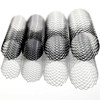The Role of Biliary Drainage in Patients with Pancreatic Adenocarcinoma
Abstract
Pancreatic cancer is one of the leading causes of cancer deaths worldwide and constitutes a major public health problem. One of the most common symptoms associated with pancreatic adenocarcinoma is jaundice, caused by the obstruction of common bile duct. Endobiliary stenting is used to relief these patients either preoperatively or merely for palliation and plastic or metal stents are usually endoscopically or percutaneously placed. Two interesting studies were presented at the 2014 ASCO Gastrointestinal Cancers Symposium. Strom et al. sought to investigate the effect of preoperative biliary drainage on recurrence and survival and they concluded that percutaneous biliary decompression was an independent predictor of worse overall survival and was associated with non-significant increase in hepatic recurrence (Abstract #314). Montero et al. presented the results of their study regarding the cost-effectiveness of metal stents in patients with inoperable pancreatic cancer and they concluded that placement of metal biliary stents is cost saving, improves overall survival and quality-adjusted survival compared with plastic stents (Abstract #260). Both studies concluded to useful results that along with the existing literature and formulated guidelines may help the provision of more effective, higher quality management of these patients.
Image: Stents
Downloads
References
Parkin DM, Bray F, Ferlay J, et al. Global cancer statistics, 2002. CA: a cancer journal for clinicians 2005;55(2):74-108.
Siegel R, Naishadham D, Jemal A. Cancer statistics, 2013. CA: a cancer journal for clinicians 2013;63(1):11-30.
Ries L, Melbert D, Krapcho M, et al. SEER cancer statistics review 1975–2004; based on November 2006 SEER data submission. http://seercancergov/csr/1975_2004/ Bethesda, MD: National Cancer Institute, 2007 2007.
Strom T, Hoffe S, Vignesh S, et al. Overall survival with preoperative biliary drainage in patients with resectable pancreatic cancer. J Clin Oncol 2014;32(Supp. 3):abstr 314.
Montero A, Meckley L, Anene A, et al. Cost-effectiveness of metal stents in pancreatic cancer. J Clin Oncol 2014;32(Suppl 3):abstr 260.
Bottger TC, Junginger T. Factors influencing morbidity and mortality after pancreaticoduodenectomy: critical analysis of 221 resections. World journal of surgery 1999;23(2):164-171; discussion 171-162.
Gundry SR, Strodel WE, Knol JA, et al. Efficacy of preoperative biliary tract decompression in patients with obstructive jaundice. Archives of surgery 1984;119(6):703-708.
Hatfield AR, Tobias R, Terblanche J, et al. Preoperative external biliary drainage in obstructive jaundice. A prospective controlled clinical trial. Lancet 1982;2(8304):896-899.
Heslin MJ, Brooks AD, Hochwald SN, et al. A preoperative biliary stent is associated with increased complications after pancreatoduodenectomy. Archives of surgery 1998;133(2):149-154.
Lai EC, Mok FP, Fan ST, et al. Preoperative endoscopic drainage for malignant obstructive jaundice. The British journal of surgery 1994;81(8):1195-1198.
McPherson GA, Benjamin IS, Hodgson HJ, et al. Pre-operative percutaneous transhepatic biliary drainage: the results of a controlled trial. The British journal of surgery 1984;71(5):371-375.
Pitt HA, Gomes AS, Lois JF, et al. Does preoperative percutaneous biliary drainage reduce operative risk or increase hospital cost? Annals of surgery 1985;201(5):545-553.
Thomas JH, Connor CS, Pierce GE, et al. Effect of biliary decompression on morbidity and mortality of pancreato-duodenectomy. American journal of surgery 1984;148(6):727-731.
Povoski SP, Karpeh MS, Jr., Conlon KC, et al. Association of preoperative biliary drainage with postoperative outcome following pancreaticoduodenectomy. Annals of surgery 1999;230(2):131-142.
van der Gaag NA, Rauws EA, van Eijck CH, et al. Preoperative biliary drainage for cancer of the head of the pancreas. The New England journal of medicine 2010;362(2):129-137.
Soderlund C, Linder S. Covered metal versus plastic stents for malignant common bile duct stenosis: a prospective, randomized, controlled trial. Gastrointestinal endoscopy 2006;63(7):986-995.
Moss AC, Morris E, Mac Mathuna P. Palliative biliary stents for obstructing pancreatic carcinoma. The Cochrane database of systematic reviews 2006(2):CD004200.
Yeoh KG, Zimmerman MJ, Cunningham JT, et al. Comparative costs of metal versus plastic biliary stent strategies for malignant obstructive jaundice by decision analysis. Gastrointestinal endoscopy 1999;49(4 Pt 1):466-471.
Kaassis M, Boyer J, Dumas R, et al. Plastic or metal stents for malignant stricture of the common bile duct? Results of a randomized prospective study. Gastrointestinal endoscopy 2003;57(2):178-182.
Baron TH, Mallery JS, Hirota WK, et al. The role of endoscopy in the evaluation and treatment of patients with pancreaticobiliary malignancy. Gastrointestinal endoscopy 2003;58(5):643-649.

Copyright (c) 2014 Maria I Toki, Konstantinos N Syrigos, Muhammad Wasif Saif

This work is licensed under a Creative Commons Attribution 4.0 International License.
As a member of Publisher International Linking Association, PILA, iMedPub Group’s JOP follows the Creative Commons Attribution License and Scholars Open Access publishing policies. Journal of the Pancreas is the Council Contributor Member of Council of Science Editors (CSE) and following the CSE slogan Education, Ethics, and Evidence for Editors.